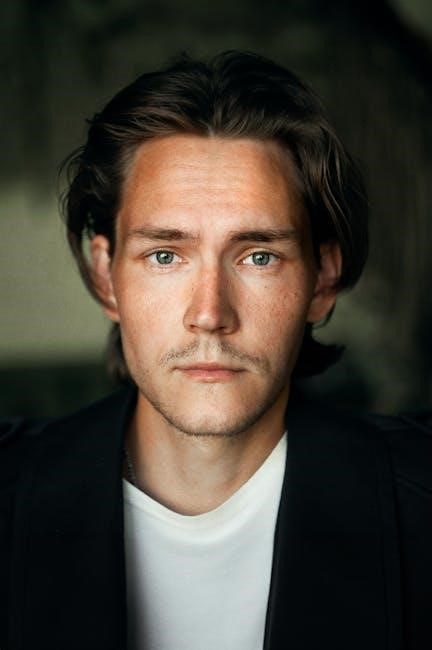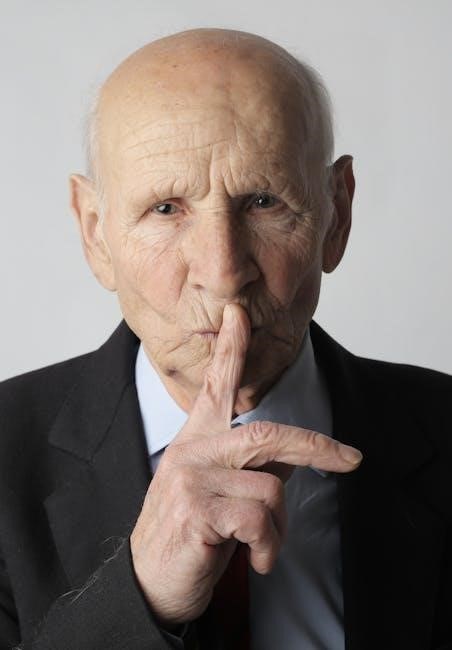In “Determined,” Robert Sapolsky presents a compelling case against free will, arguing that human behavior is entirely shaped by genetics, environment, and past experiences․ Building on his earlier work in Behave, Sapolsky combines neuroscience, psychology, and philosophy to demonstrate that our choices are predetermined, challenging the notion of moral responsibility․ This book, through its meticulous analysis, invites readers to rethink justice, morality, and personal accountability, advocating for a more empathetic society․
Overview of the Book’s Thesis
In Determined: A Science of Life Without Free Will, Robert Sapolsky presents a comprehensive argument against the concept of free will, asserting that human behavior is entirely determined by biological, environmental, and historical factors․ Sapolsky contends that every decision, action, and thought is the result of a complex interplay between genetics, neurobiology, upbringing, and external circumstances, leaving no room for genuine self-determination․ He systematically dismantles the notion of free will by exploring the role of neurotransmitters, hormones, and brain function, as well as the influence of chaos theory and quantum physics, which some argue could introduce indeterminacy․ Sapolsky argues that even if these factors create unpredictability, they do not equate to freedom of choice․ Instead, he posits that our sense of agency is an illusion created by the brain’s ability to construct narratives after the fact․ By synthesizing insights from neuroscience, psychology, and philosophy, Sapolsky builds a compelling case for a deterministic worldview, urging readers to reconsider their understanding of morality, responsibility, and justice in light of this perspective․
Background on Robert Sapolsky
Robert M․ Sapolsky is a renowned American neuroendocrinologist, professor of biology and neurology at Stanford University, and a recipient of the MacArthur Foundation Genius Grant․ Known for his interdisciplinary approach, Sapolsky has written extensively on human behavior, neuroscience, and the intersection of biology and society․ His earlier works, such as A Primate’s Memoir and Why Zebras Don’t Get Ulcers, have established him as a leading voice in understanding stress, behavior, and the human condition․ Sapolsky’s 2017 book, Behave, explored the biological and environmental factors influencing human behavior, laying the groundwork for his latest work, Determined․ His writing is celebrated for its accessibility, blending scientific rigor with engaging storytelling․ Sapolsky’s work challenges readers to rethink traditional notions of morality, responsibility, and justice, advocating for a more compassionate understanding of human actions․ His research and writings have had a profound impact on both academic and public discourse, making him one of the most respected and influential scientists of his generation․

The Core Argument: The Illusion of Free Will

Robert Sapolsky argues that free will is an illusion, asserting that human behavior is entirely determined by genetics, environment, and past experiences․ He contends that every decision, from the simplest to the most complex, is the inevitable result of prior causes, leaving no room for conscious control․
The Role of Genetics and Biology

Robert Sapolsky emphasizes that genetics and biology play a central role in shaping human behavior, leaving no room for free will․ He explains that our genes determine the structure and function of the brain, influencing everything from hormones to neurotransmitters․ These biological factors, in turn, dictate how we respond to stimuli, make decisions, and behave․ Sapolsky argues that even our sense of self is an illusion created by the brain, as every thought and action is the result of prior biological and environmental factors․ He illustrates how genetic predispositions, combined with environmental influences, create a deterministic chain of causes that lead to our choices․ By examining the interplay between genes and environment, Sapolsky demonstrates that our behavior is the inevitable outcome of biological processes, not conscious control․ This perspective challenges traditional notions of moral responsibility and highlights the profound impact of biology on human decision-making․
The Impact of Environment and Upbringing
Robert Sapolsky extensively explores how environment and upbringing shape human behavior, further undermining the concept of free will․ He argues that our surroundings, from family dynamics to cultural norms, profoundly influence our choices and actions․ Sapolsky illustrates how early life experiences, such as parenting styles and socioeconomic conditions, mold brain development and behavior․ For instance, stress and trauma in childhood can alter the structure and function of the brain, leading to predictable behavioral patterns later in life․ Similarly, cultural values and social norms act as unseen forces that guide decision-making, often outside of conscious awareness․ Sapolsky emphasizes that these environmental factors interact with genetic predispositions, creating a complex interplay that determines behavior․ By examining the role of nurture, Sapolsky demonstrates that our choices are not the result of free will but rather the inevitable outcome of a combination of genetic and environmental influences․ This perspective challenges the idea of personal responsibility and highlights the need for empathy and understanding in addressing human behavior․

The Science Behind Determinism
Robert Sapolsky builds his case for determinism on a foundation of neuroscience and biology, illustrating how brain function and genetic factors dictate behavior․ He refutes arguments from quantum physics and chaos theory, reinforcing the idea that our choices are predetermined․
Neuroscience and Brain Function

Robert Sapolsky delves into the intricacies of neuroscience to argue that brain function predetermines human behavior․ He explains that neural activity in the brain often occurs before conscious awareness of a decision, suggesting that our choices are biological phenomena rather than acts of free will․ Sapolsky emphasizes that the brain operates based on genetic predispositions, past experiences, and environmental influences, all of which are beyond individual control․ He discusses how specific brain regions, such as the prefrontal cortex, are involved in decision-making processes that are inherently deterministic․ By examining the biological underpinnings of consciousness, Sapolsky challenges the concept of a separate, autonomous “self” that willfully directs actions․ Instead, he posits that behavior is the inevitable result of complex neural mechanisms shaped by factors like genetics, upbringing, and external stimuli․ This perspective underscores the idea that our sense of agency is an illusion, rooted in the brain’s ability to rationalize actions after they have already been set in motion․ Through this lens, Sapolsky argues that understanding the neuroscience behind decision-making is crucial for reevaluating concepts like moral responsibility and justice․

Psychological Factors Influencing Decision-Making
Robert Sapolsky explores how psychological factors, deeply rooted in biology and environment, shape decision-making processes․ He argues that emotions, past experiences, and learned behaviors are central to how individuals make choices․ Sapolsky emphasizes that these psychological elements are not under conscious control but are instead products of genetics, upbringing, and external influences․ For instance, stress, trauma, and cultural norms profoundly impact decision-making, often operating subconsciously․ Sapolsky also highlights the interplay between reason and emotion, where emotions frequently override rational thinking․ He illustrates how psychological biases, such as confirmation bias and the availability heuristic, further constrain the idea of free will․ By examining these psychological mechanisms, Sapolsky demonstrates that decisions are the result of a complex interplay between internal and external factors, rather than an act of autonomous choice․ This understanding challenges traditional notions of moral responsibility and encourages a more compassionate approach to human behavior․ Ultimately, Sapolsky’s analysis of psychological factors underscores his broader argument that our choices are predetermined by forces beyond our control․

Challenging Counterarguments
Sapolsky addresses arguments like quantum physics and chaos theory, often cited as potential sources of free will․ He argues that these concepts do not provide the freedom required for autonomous decision-making, reinforcing his case for determinism․
Critique of Quantum Physics
Robert Sapolsky critiques the argument that quantum physics provides a basis for free will, arguing that quantum indeterminacy does not translate to human freedom․ He explains that while quantum mechanics introduces randomness at a subatomic level, this does not scale up to conscious decision-making․ Sapolsky contends that even if quantum events influence brain activity, they remain part of a causal chain, not a source of autonomy․ He emphasizes that human behavior is still governed by prior causes, such as biology and environment, rather than uncaused quantum fluctuations․ This critique challenges the notion that quantum physics creates a “gap” for free will, asserting that such claims misunderstand the relationship between quantum phenomena and macroscopic human choices․ Sapolsky’s argument aligns with his broader case for determinism, where all actions, even those influenced by quantum processes, are ultimately the result of factors beyond personal control․
Addressing Chaos Theory
Robert Sapolsky addresses chaos theory as a potential counterargument to determinism, acknowledging its complexity but ultimately rejecting its relevance to free will․ He explains that chaos theory, which describes how small changes can lead to large, unpredictable outcomes, is often cited as evidence for indeterminacy in human behavior․ However, Sapolsky argues that chaos theory does not provide a basis for free will, as it remains a deterministic process governed by prior causes․ Even in chaotic systems, outcomes are the result of physical laws and initial conditions, not uncaused events․ Sapolsky emphasizes that human decision-making, while complex, is still rooted in biology, environment, and past experiences, rather than random or uncaused events․ He critiques the notion that chaos theory introduces a “gap” for free will, asserting that such claims misunderstand the nature of both chaos and human behavior․ By addressing chaos theory, Sapolsky strengthens his case for determinism, demonstrating that even in seemingly unpredictable systems, causality prevails, and free will remains an illusion․
In “Determined,” Robert Sapolsky delivers a profound exploration of the illusion of free will, concluding that human behavior is entirely shaped by biology, environment, and past experiences; He argues that accepting determinism, though challenging, opens the door to a more compassionate and equitable society․ Sapolsky challenges traditional notions of moral responsibility, advocating for a shift in how we approach punishment, justice, and morality․ By dismantling the concept of free will, he encourages readers to embrace a deeper understanding of human behavior, fostering empathy and tolerance․ The book concludes with a hopeful vision: a world where the recognition of determinism leads to more humane policies and interpersonal relationships․ Sapolsky’s compelling synthesis of science and philosophy leaves readers with a new perspective on the nature of choice and responsibility, urging us to rethink our assumptions about what it means to be human․ Through his accessible and engaging writing, Sapolsky makes a powerful case for a future grounded in understanding rather than blame․
